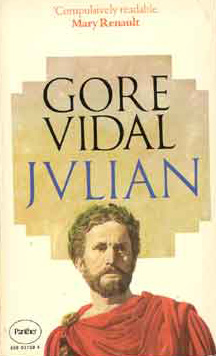Below, abridged translation from the first
volume of Karlheinz Deschner’s Kriminalgeschichte
des Christentums (Criminal History of Christianity)
Christian tall stories
Christians, preachers of love of the enemy and of the doctrine that all authority emanates from God, celebrated the death of the emperor with great public banquets, with festivals in churches and chapels and dances in the theatres of Antioch: the city that, as Ernest Renan says, ‘was full of puppeteers, charlatans, actors, magicians, thaumaturges, witches and religious swindlers’.
The diatribe in three volumes that Julian had written shortly before his death, Against the Galileans, was promptly destroyed, but fifty years later, Cyril, the doctor of the Church still bothered to argue against it: Pro sanela Christianorum religione adversas libros athei Julian in thirty volumes, of which ten have reached us in their Greek text and ten others in Greek and Syriac fragments. Naturally, a bishop like Cyril, an avowed enemy of philosophy who even tried to prohibit its teaching in Alexandria, did not intend to grasp the thought of Julian, but only ‘crush it with maximum energy’ (Jouassard).
The Christians also destroyed all the portraits of Julian and the epigraphs that commemorated his victories, without sparing means to erase from the memory of men the remembrances of him.
During Julian’s life, the most famous doctors of the Church had kept a prudent silence, but shortly after his death, and for a long time more, they dedicated themselves to attacking him.
Ephrem, another saint whose odious songs were repeated by the parishioners of Edessa, dedicated a whole treatise to ‘Julian the Apostate’, the ‘pagan emperor’ and, according to him, ‘frantic’, ‘tyrant’, ‘trickster’, ‘damned’ ‘and’ idolatrous priest’. ‘His ambition caught the deadly release’ that ‘tore his body pregnant with oracles from his magicians’ to send him definitively ‘to hell’. The clerical historians of the 5th century, who sometimes were also jurists, such as Rufinus, Socrates, Philostorgius, Sozomen and Theodoret, speak of Julian in a still worse tone.
While the Christian world defamed the ‘apostate’, as he usually does with its enemies, the Enlightenment corrected that image in the diametrically opposite sense.
In 1699, the Protestant theologian Gottfried Arnold, in his Impartial History of the Church and of Heresy, rehabilitated the figure of Julian.
A few decades later, Montesquieu praised him as a statesman and legislator. Voltaire wrote: ‘Thus, that man who has been described to us horribly was perhaps the most noble of all, or at least the second’. Montaigne and Chateaubriand count him among the greatest historical figures.
Goethe praised himself for understanding and sharing Julian’s animosity against Christianity. Schiller wanted to make him protagonist of one of his dramas.
Shaftesbury and Fielding praised him, and Gibbon believes that he deserved to have owned the world. Ibsen wrote Caesar and Galilee and Nikos Kazantzakis his tragedy Julian the Apostate, premiered in Paris in 1948.

More recently, between 1962 and 1964, the North American Gore Vidal dedicated a novel to him. On the other hand, the Benedictine Baur (representative, in this, of many current Catholics) continues to defame Julian in the 20th century.
After the death of Julian, and having renounced the designated successor, Salutius, a moderate pagan philosopher and prefect of the praetorians of the East who had been a personal friend of Julian, the Illyrian Jovian acceded to the throne.
One reply on “Kriminalgeschichte, 40”
A correspondent from the UK has asked me to show this YouTube book to the WDH audience:
https://youtu.be/8kWydTSxUh8